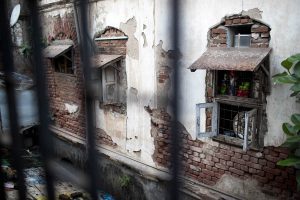By Drew Strayer, Pastor of Groups & Care, Manor Church
As one of the pastors in a local [U.S.] church, I am tasked with engaging our congregation with opportunities to grow in understanding God and God’s ways—as well as how they can engage the world with God. When our friends at HOPE International approached us with the chance to host a poverty simulation, we jumped at the opportunity to meet a need we knew existed in our body: We needed to go deeper in our understanding of God’s heart for those living in poverty.
People in our local churches are inundated with information: talks, lectures, sermons, and blog posts that provide perspectives on God, God’s Word, the state of the world, and how we should live in it. However, practical experience is often a better teacher, accessing parts of our brains left untouched by written or spoken words alone.
Also, people in our church have a heart for both the local community and the world. They want to see people’s hearts turned toward Christ just as they also want them “warm and well-fed.” So our church giving supports work in the community around us, along with various service and missionary endeavors around the world.
 We’re thankful for many teachers who lead us well on helping without hurting, both locally and internationally. And yet, this head knowledge still leaves us needing more—and that is where HOPE’s simulation meets a need in all our churches. Yes, we want to help others in need, but to truly help in godly ways, we need deeper insight into the experiences of our brothers and sisters trapped in poverty around the world!
We’re thankful for many teachers who lead us well on helping without hurting, both locally and internationally. And yet, this head knowledge still leaves us needing more—and that is where HOPE’s simulation meets a need in all our churches. Yes, we want to help others in need, but to truly help in godly ways, we need deeper insight into the experiences of our brothers and sisters trapped in poverty around the world!
The great thing about the poverty simulation is that the experience addresses the gaps in our understanding of poverty. As humble leaders, informed and confident, HOPE staff encourage our members’ learning process, recognizing the challenging nature of the information they share.
For the simulation, HOPE came in and set up, and we provided a few volunteers to help set up and then serve a few roles in the simulation. This way, all the folks who wished to attend from our church (and we were blessed to be joined by friends from other local churches as well) were exposed to a taste of the challenges faced by our brothers and sisters around the world.
EVERYONE I listened to that participated shared with me how they grew in understanding, compassion, and a desire to pray and engage those affected by systemic poverty around the world. Another fantastic aspect is their insightful debrief process at the conclusion of the evening. I knew that our people would leave the experience with healthy, informed understanding and hearts touched with a renewed passion to care for others!
I can’t thank HOPE enough for the ways they help us “be the church” God is calling us to be!
The HOPE Poverty Simulation is a two-and-a-half hour, immersive learning experience designed to help participants glimpse the realities of a lifetime in extreme poverty. Interested in attending a simulation? Interested in having your church host a simulation? Find out more here.
 Drew’s service at Manor Church focuses on strengthening Life Groups and their leaders, encouraging those in need of care, and leading the missions focus, from our neighborhood to around the world! When not serving at Manor, Drew enjoys family game or movie nights at home, hikes and backpacking expeditions in the woods and mountains, good coffee, good books, and deep conversations with friends!
Drew’s service at Manor Church focuses on strengthening Life Groups and their leaders, encouraging those in need of care, and leading the missions focus, from our neighborhood to around the world! When not serving at Manor, Drew enjoys family game or movie nights at home, hikes and backpacking expeditions in the woods and mountains, good coffee, good books, and deep conversations with friends!
















